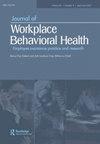衡量尼日利亚银行家员工的幸福感:探索社会文化指标
IF 0.8
Q3 PUBLIC, ENVIRONMENTAL & OCCUPATIONAL HEALTH
引用次数: 2
摘要
员工的幸福感,即员工的生活体验和工作功能的整体质量,是多维的、依赖于环境的。当今社会的现实表明,在衡量员工的幸福感时,不仅心理和生理因素,而且社会因素都是必不可少的。在许多发达国家,犯罪和其他社会问题得到充分重视;然而,在尼日利亚,工人面临着许多与社会和文化相关的挑战,如不安全感、社区和家庭冲突,甚至在工作环境之外,这导致了福祉问题。尼日利亚以前的研究更多地关注心理和身体健康,而没有充分关注职业压力和工作环境。因此,本研究旨在研究与尼日利亚银行业工人福利相关的社会和文化因素。采用多阶段抽样技术,在尼日利亚伊巴丹的银行工作人员中发放了420份调查问卷,并进行了30次访谈。28项评估心理、身体和社会文化福祉的项目使用五点李克特量表进行了检查。研究人员使用描述性统计、双变量相关和内容分析来分析数据。研究结果显示,社会文化因素是影响银行员工幸福感的重要因素。超过77%的受访者认为抢劫袭击、家庭和公众信任对他们的心理状态有严重影响。社会幸福感与身体素质显著相关(r = .884;P < .001)和心理(r = .921;P < 0.001)。访谈结果显示,家庭和社区关系、安全和公众对领导的信任对员工幸福感的影响甚至超过加薪。本研究表明,工人的整体生活经验是一个同样重要的决定因素,工人的福祉,因为他们的心理和身体健康。这些发现表明,文化、家庭和社区关系等社会文化属性是员工整体生活体验的重要方面,在衡量员工幸福感时应予以考虑。本文章由计算机程序翻译,如有差异,请以英文原文为准。
Measuring employees’ well-being among Nigerian bankers: Exploring the socio-cultural indicators
Abstract Employees’ well-being, the overall quality of workers’ life experience and functioning at work, is multidimensional and context-dependent. The reality of present society suggests that not only the psychological and physical, but social factors are essential in measuring employees’ well-being. In many developed countries, crime and other societal issues received adequate attention; however, in Nigeria, workers are confronted with many social- and cultural-related challenges like insecurity and community and family conflicts, even outside the work environment, which lead to well-being problems. Previous studies in Nigeria have focused more on psychological and physical well-being, without sufficient attention to occupational stress and the work environment. Therefore, this study was conducted to examine the social and cultural factors related to the well-being of workers in the Nigerian banking industry. Four-hundred and twenty copies of questionnaires were administered and 30 interviews were conducted using a multi-stage sampling technique among bank workers in Ibadan, Nigeria. Twenty-eight items evaluating psychological, physical, and socio-cultural well-being were examined using a five-point Likert scale. Researchers analyzed data using descriptive statistics, bivariate correlation, and content analysis. The findings revealed that socio-cultural factors are important sources of happiness and well-being of bank workers. Over 77% of the respondents viewed robbery attacks, family, and public trust as having a severe effect on their state of mind. Social well-being was significantly correlated with physical (r = .884; p < .001) and psychological (r = .921; p < .001) well-being. Results from the interviews showed that family and community relationships, security, and public trust in leadership affect employee’s well-being even more than a pay raise. This study demonstrates that the overall life experience of workers is an equally important determinant of workers' well-being as their psychological and physical well-being. These findings suggest that sociocultural attributes like culture, family, and community relationships are an important aspect of workers’ overall life experience, and should be considered in the measurement of workers' well-being.
求助全文
通过发布文献求助,成功后即可免费获取论文全文。
去求助
来源期刊

Journal of Workplace Behavioral Health
PUBLIC, ENVIRONMENTAL & OCCUPATIONAL HEALTH-
CiteScore
2.40
自引率
6.70%
发文量
14
期刊介绍:
The Journal of Workplace Behavioral Health, retitled from Employee Assistance Quarterly to better reflect its expanded focus, presents innovative research, applied theory, and practical information to keep workplace human service administrators, counselors, and consultants up to date on the latest developments in the field. This refereed journal is an essential guide to best practice and research issues faced by EAP professionals who deal with work-related and personal issues including workplace and family wellness, employee benefits, and organizational development.
 求助内容:
求助内容: 应助结果提醒方式:
应助结果提醒方式:


